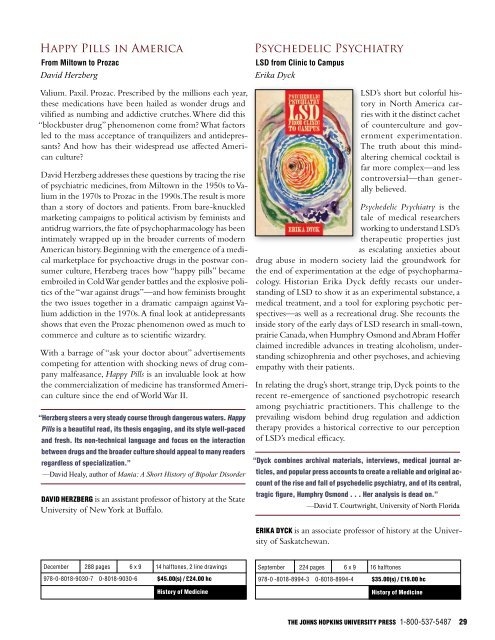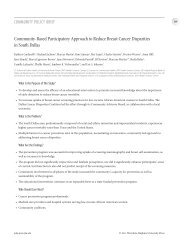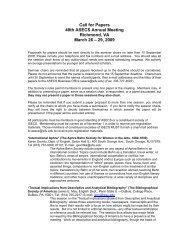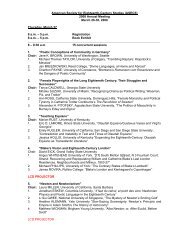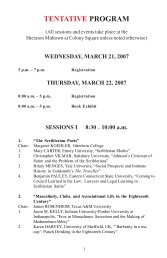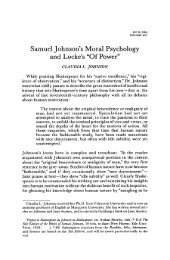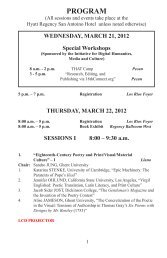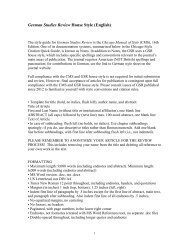Fall 2008 - The Johns Hopkins University Press
Fall 2008 - The Johns Hopkins University Press
Fall 2008 - The Johns Hopkins University Press
You also want an ePaper? Increase the reach of your titles
YUMPU automatically turns print PDFs into web optimized ePapers that Google loves.
Happy Pills in AmericaFrom Miltown to ProzacDavid HerzbergValium. Paxil. Prozac. Prescribed by the millions each year,these medications have been hailed as wonder drugs andvilified as numbing and addictive crutches. Where did this“blockbuster drug” phenomenon come from? What factorsled to the mass acceptance of tranquilizers and antidepressants?And how has their widespread use affected Americanculture?David Herzberg addresses these questions by tracing the riseof psychiatric medicines, from Miltown in the 1950s to Valiumin the 1970s to Prozac in the 1990s. <strong>The</strong> result is morethan a story of doctors and patients. From bare-knuckledmarketing campaigns to political activism by feminists andantidrug warriors, the fate of psychopharmacology has beenintimately wrapped up in the broader currents of modernAmerican history. Beginning with the emergence of a medicalmarketplace for psychoactive drugs in the postwar consumerculture, Herzberg traces how “happy pills” becameembroiled in Cold War gender battles and the explosive politicsof the “war against drugs”—and how feminists broughtthe two issues together in a dramatic campaign against Valiumaddiction in the 1970s. A final look at antidepressantsshows that even the Prozac phenomenon owed as much tocommerce and culture as to scientific wizardry.With a barrage of “ask your doctor about” advertisementscompeting for attention with shocking news of drug companymalfeasance, Happy Pills is an invaluable look at howthe commercialization of medicine has transformed Americanculture since the end of World War II.“Herzberg steers a very steady course through dangerous waters. HappyPills is a beautiful read, its thesis engaging, and its style well-pacedand fresh. Its non-technical language and focus on the interactionbetween drugs and the broader culture should appeal to many readersregardless of specialization.”—David Healy, author of Mania: A Short History of Bipolar DisorderDavid Herzberg is an assistant professor of history at the State<strong>University</strong> of New York at Buffalo.Psychedelic PsychiatryLSD from Clinic to CampusErika DyckLSD’s short but colorful historyin North America carrieswith it the distinct cachetof counterculture and governmentexperimentation.<strong>The</strong> truth about this mindalteringchemical cocktail isfar more complex—and lesscontroversial—than generallybelieved.Psychedelic Psychiatry is thetale of medical researchersworking to understand LSD’stherapeutic properties justas escalating anxieties aboutdrug abuse in modern society laid the groundwork forthe end of experimentation at the edge of psychopharmacology.Historian Erika Dyck deftly recasts our understandingof LSD to show it as an experimental substance, amedical treatment, and a tool for exploring psychotic perspectives—aswell as a recreational drug. She recounts theinside story of the early days of LSD research in small-town,prairie Canada, when Humphry Osmond and Abram Hofferclaimed incredible advances in treating alcoholism, understandingschizophrenia and other psychoses, and achievingempathy with their patients.In relating the drug’s short, strange trip, Dyck points to therecent re-emergence of sanctioned psychotropic researchamong psychiatric practitioners. This challenge to theprevailing wisdom behind drug regulation and addictiontherapy provides a historical corrective to our perceptionof LSD’s medical efficacy.“Dyck combines archival materials, interviews, medical journal articles,and popular press accounts to create a reliable and original accountof the rise and fall of psychedelic psychiatry, and of its central,tragic figure, Humphry Osmond . . . Her analysis is dead on.”—David T. Courtwright, <strong>University</strong> of North FloridaErika DycK is an associate professor of history at the <strong>University</strong>of Saskatchewan.December 288 pages 6 x 9 14 halftones, 2 line drawings978-0-8018-9030-7 0-8018-9030-6 $45.00(s) / £24.00 hcHistory of MedicineSeptember 224 pages 6 x 9 16 halftones978-0 -8018-8994-3 0-8018-8994-4 $35.00(s) / £19.00 hcHistory of MedicineTHE JOHNS HOPKINS UNIVERSITY PRESS 1-800-537-5487 29


